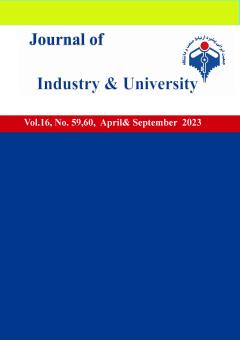Identifying Factors Affecting the Valuation of Technology-Based Startups in Mashhad
Subject Areas : General
hamid Heydarizad
1
![]() ,
Amir Ghafourian Shagerdi
2
,
Amir Ghafourian Shagerdi
2
![]() ,
omid behboodi
3
,
omid behboodi
3
![]()
1 - M A Business Administration, Faculty of Administrative Sciences, Imam Reza International University, Mashhad, Iran
2 - Associate Professor of Accounting Department, Faculty of Administrative Sciences, Imam Reza International University, Mashhad, Iran
3 - Assistant Professor of Management, Attar Institute of Higher Education of Mashhad
Keywords: Valuation, Startup, Technology, Delphi Analysis,
Abstract :
The aim of the current research is to identify the factors affecting the valuation of technology-based startups in the city of Mashhad. The current research is applied in terms of purpose and qualitative method in terms of type, which was done with Delphi model. The population and statistical sample of 20 professors and experts with management expertise and active in the field of start-ups were selected by purposeful sampling. The research tool was a Delphi questionnaire, whose validity was also checked and confirmed. The Delphi pattern analysis method was also used to analyze the data. At first, by studying the sources of 50 components in 8 key dimensions (having expert management, the necessary knowledge and expertise of human resources, technological infrastructure and practical applications, information security in the startup network, financial and legal support, financial and economic and market position) as factors Effective on the valuation of technology-based startups, During three Delphi stages, 45 factors finally reached the consensus of the experts and were prioritized. The most important factors affecting the valuation of technology-based startups in Mashhad include the bargaining power of customers, flexibility in technology and technology, the use of correct data in the development of startups, the cost of reproducing technical knowledge, the combination of people with core expertise needed in the business team, location Market exclusivity, technology readiness, high market-friendly technology, use of global knowledge and information in ideation and implementation, required investment volume
Arab, A., Mohammad Reza, Ch., Mohammad Sharif, Sh., & Mohammad Baqer, G. (2020). Commercialization of knowledge based on the role of managerial ambidexterity in higher education. Karafan, 291-310, 2(18). (In persian)
Arbabi, P. (2017). Valuation of startups in the field of information technology-based companies, Master's thesis, Tehran University of Science and Culture. (In persian)
Ashtari Mehrjardi, A. (2018). A social study of the factors of the emergence and decline of start-ups in the country, Tehran: Research Center for Cultural and Social Studies. (In persian
Bandarian, R., & Mousai, A. (2015). Taking advantage of existing industries is a solution to facilitate commercialization. Roshd Fanavar Quarterly, 5(18). (In persian)
Behboodi, o. (2019). Designing a marketing dashboard template in Iran's tourism industry. PhD Thesis, Islamic Azad University, Shahrood, Iran. (In persian)
Borelli, J. (2019). Rebooting journalism: how media startups overcame the business model crisis. What can we learn from Eldiario. es and Mediapart?.
Cohen , R (2016). Entry regulation as a barrier to entrepreneurship. Financial Economics, 82, 591–629.
Deddy SUSHANDOYO,RETNA AYU MUSTIKARINI KENCANASARI, EKO AGUS PRASETIO, and YOSHIYUKI MATSUURA(2022). THE INFLUENCES OF TECHNOLOGICAL CAPABILITY AND MARKET ORIENTATION TOWARD BUSINESS MODEL INNOVATIONS OF DIGITAL STARTUPS. International Journal of Innovation Management, 26(2).
Ellingsen, O. (2017). Commercialization within Advanced Manufacturing: Value Stream Mapping as a Tool for Efficient Learning. Norwegian University of Science and Technology, Procedia CIRP, 60, 374–379.
Esfahanian, M. (2017). The influence of entrepreneurial leaders on the growth of startups, Master's thesis, Shahid Beheshti University. (In persian)
Fadai Fathabadi, M. (2016). Identifying and prioritizing factors affecting the success of start-ups in the entrepreneurial ecosystem of Iran, Master's thesis, Tabriz University. (In persian)
Farahmand, K., Daneshvar, M., Shahnoushi, N., Ghasemi, V., & Hemmati, A. (2012). Factors affecting market development of saffron using Fuzzy Delphi. Agricultural Economics, 6(3), 121-143. (In persian)
Faruzandeh, M., Fard, R., & Hamidizadeh, A. (2021). The application of the mixed approach in shaping the international entrepreneurial marketing model of fintechs (case study: Saderat Bank of Iran). Business Strategies, 18(17), 169-199. (In persian)
Fini, R., Grimaldi, R., & Meoli, A. (2020). The Effectiveness of University Regulations to Foster Science-Based Entrepreneurship. Research Policy.
Hosni, M. A., Shah Mansouri, A., & Bazaei, Q. A. (2021). Identifying the opportunities and challenges of block chain technology in the economy of industrial businesses. Economics and Business, 12(22). (In persian)
Hsu, Ch., and Sandford, BA. (2008). The Delphi technique: making sense of consensus. Available from: http://pareonline.net/pdf/v12n10.pdf.
Hsu, Chia-Chien, and Brian A. S. (2007). The Delphi Technique: Making Sense of Consensus. Practical Assessment, Research & Evaluation Journal, 21 (10): 1.
Keeney, S., Hasson, F., and McKenna, HP. (2001). A critical review of the Delphi technique as a research methodologyfor nursing. Int J Nurs Stud, 38(2): 195-200.
Kohraei, S., & Shivai, E. (2021). Investigating the effect of the development of knowledge-based companies and innovative start-ups in science and technology parks on the growth of the regional economy in Iran. Innovation Ecosystem, 1(2). (In persian)
Landeta J. (2006). Current validity of the Delphi method in social sciences. Technological Forecasting and Social Change, 73(5): 467-82.
Moro Visconti, R. (2019). The Valuation of Technological Startups. SSRN Electronic Journal. doi:10.2139/ssrn.3533876
Rahimi Klishadi, M. (2017). An introduction to the valuation of start-ups and new businesses, the 12th National Congress of Pioneers of Progress, Tehran. (In persian)
Tahirpur, H., & Tayibi Tolo, A. (2019) Relationship between customer relationship management (CRM) and marketing performance. Business Management Perspective, 1, 109-122. (In persian)


